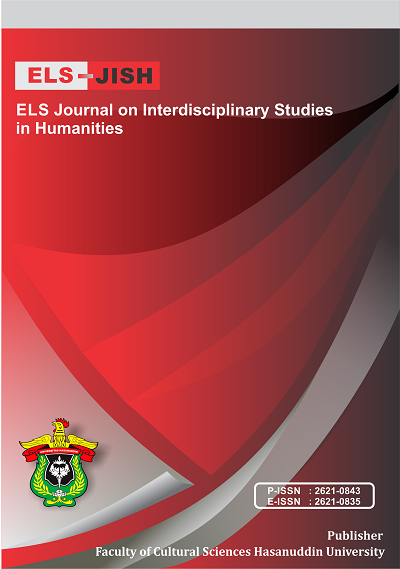Modular Distance Learning in the New Normal: Challenges on its Implementation
DOI:
https://doi.org/10.34050/elsjish.v6i3.26804Keywords:
Challenges, Modular Distance Learning, New NormalAbstract
This basic research was conducted to determine the challenges of teachers in the implementation of modular distance learning in the new normal of the public elementary and secondary schools in the District of Gitagum, Division of Misamis Oriental. Specifically, it sought to: a) describe the characteristics of the respondents; b) determine the challenges encountered by the teachers in terms of accessibility, availability of resources, support to learners, teachers’ competence and teaching strategies, assessment, and health and safety measures; c) determine the significant relationship between the respondents’ challenges and their characteristics; and d) come up with an intervention plan based on the results of the study. The respondents of the study were the one hundred five (144) public school teachers in the District of Gitagum, Division of Misamis Oriental. A researcher-made survey questionnaire was employed to obtain specific information about the study. The data were analyzed using descriptive statistics such as frequency counting of data, percentage, mean and standard deviation. Pearson Product Moment of Correlation was employed to test the significant relationship between the respondent’s challenges and their characteristics. An intervention plan was designed to help teachers in finding solutions to the challenges they are facing in the implementation of modular distance learning. The teachers’ challenges were low in the implementation of modular distance learning. It suggests that teachers faced few challenges or that the challenges they encountered were of low intensity. In other words, it implies that teachers found it relatively manageable to implement modular distance learning, and the difficulties they encountered were not severe. Teachers’ challenges were significant to sex, position, teaching experience and attitudes towards modular distance learning in the new normal. It is recommended that teachers seek support from stakeholders and the local government to acquire funds for better implementation.
References
Abe, T. O., & Adu, E. I. (2014). The effect of teachers’ qualifications on students’ performance in mathematics. Sky Journal of Educational Research, 2(1), 010-014.
Alea, L. A., Fabrea, M. F., Roldan, R. D. A., & Farooqi, A. Z. (2020). Teachers' Covid-19 awareness, distance learning education experiences and perceptions towards institutional readiness and challenges. International Journal of Learning, Teaching and Educational Research, 19(6), 127-144.
Avvisati, F. (2018). How are school performance and school climate related to teachers’ experience?. PISA in Focus, https://www.oecd-ilibrary.org/education/how-are-school-performance-and-school-climate-related-to-teachers-experience_af992283-en
Calipay, C. (2020). 1.1M Bicol families to benefit from DSWD amelioration package. Philippine News Agency. https://www.pna.gov.ph/articles/1098504
Cahapay, M. B. (2020). Rethinking Education in the New Normal Post-COVID-19 Era: A Curriculum Studies Perspective. Aquademia, 4(2), ep20018. https://doi.org/10.29333/aquademia/8315
Chu, J. H., Loyalka, P., Chu, J., Qu, Q., Shi, Y., & Li, G. (2015). The impact of teacher credentials on student achievement in China. China Economic Review, 36, 14-24.
Culajara, C. J. (2023). Improving teachers’ professional development through School Learning Action Cell (SLAC). Journal of Research, Policy & Practice of Teachers and Teacher Education, 13(1), 76-88.
Department of Education. (2020). Operational guidelines on the implementation of distance learning delivery modalities in DepEd-Naga City for school year 2020-2021, Division Memo No. 161. S. 2020 Schools Division of Naga City.
Esongo, N. M. (2017). Correlation between the Availability of Resources and Efficiency of the School System within the Framework of the Implementation of Competency-Based Teaching Approaches in Cameroon. Journal of Education and Practice, 8(2), 82-92.
Gowder, S. J. T. (2016). Philosophical, Psychological, Sociological and Scientific (PPSS) Basis of Teaching for University Health Sciences Students. J Health Edu Res Dev, 4, e123.
Jones, K., & Tzekaki, M. (2016). Research on the teaching and learning of geometry. The second handbook of research on the psychology of mathematics education, 109-149.
Kini, T., & Podolsky, A. (2016). Teaching experience and teacher effectiveness. American Educator, 40(3), 3.
Liaquat, S., & Naz, A. (2016). Analytical Study of Teacher Educators' Metaphors of Teaching. Journal of Education and Educational Development, 3(1), 30-51.
Llego, M. (2019). 2019 DepEd Teacher Induction Program (TIP). TeacherPH. Retrieved from https://www.teacherph.com/teacher-induction-program/ , December 19, 2019
Llego, J., Saqri, S., Gabriel, E., & Corpus, J. (2020). The predictive strength of academic performance in passing the Philippine nurse licensure examination. International Journal of Innovation, Creativity, and Change, 13(1), 425-437.
Manila Bulletin. (2020). DepED: Most students prefer “modular” learning over online. Retrieved on September 7, 2020 from https://mb.com.ph/2020/07/03/deped-most-students-prefer-modular-learning-over-online/
Nishioka, H. (2023). My Korean language teachers are YouTubers: learning Korean via self-instruction. Computer Assisted Language Learning, 36(3), 346-374.
Pedroso, J. E. P., Siason Jr, N. D., & Tangco-Siason, A. (2021). Principal’s leadership practices during the COVID 19 pandemic: An exploratory study. International Journal of Arts and Humanities Studies, 1(1), 76-87.
Rich, M. (2016). Why teachers on TV have to be incompetent or inspiring. New York Times.
Sukmawaty, Rahman, F. F., & Andini, C. (2022). Covid-19 Pandemic and Axiology of Communication: A Study of Linguistic Phenomena. IJISRT, 7(4), 1079-1087.
Tran, Y. (2015). ESL Pedagogy and Certification: Teacher Perceptions and Efficacy. Journal of Education and Learning, 4(2), 28-42.
Toquero, C. M. (2020). Challenges and Opportunities for Higher Education amid the COVID-19 Pandemic: The Philippine Context. Pedagogical Research, 5(4). https://doi.org/10.29333/pr/7947
Ulug, M., Ozden, M. S., & Eryilmaz, A. (2011). The effects of teachers’ attitudes on students’ personality and performance. Procedia-Social and Behavioral Sciences, 30, 738-742.
UNESCO. (2020). COVID-19 Educational Disruption and Response. Retrieved from https://en.unesco.org/covid19/educationresponse
Wolpert-Gawron, H. (2013). 'Tween Crayons and Curfews: Tips for Middle School Teachers. Routledge.
Downloads
Published
How to Cite
Issue
Section
License
Copyright (c) 2023 Acut Junpel

This work is licensed under a Creative Commons Attribution-ShareAlike 4.0 International License.






